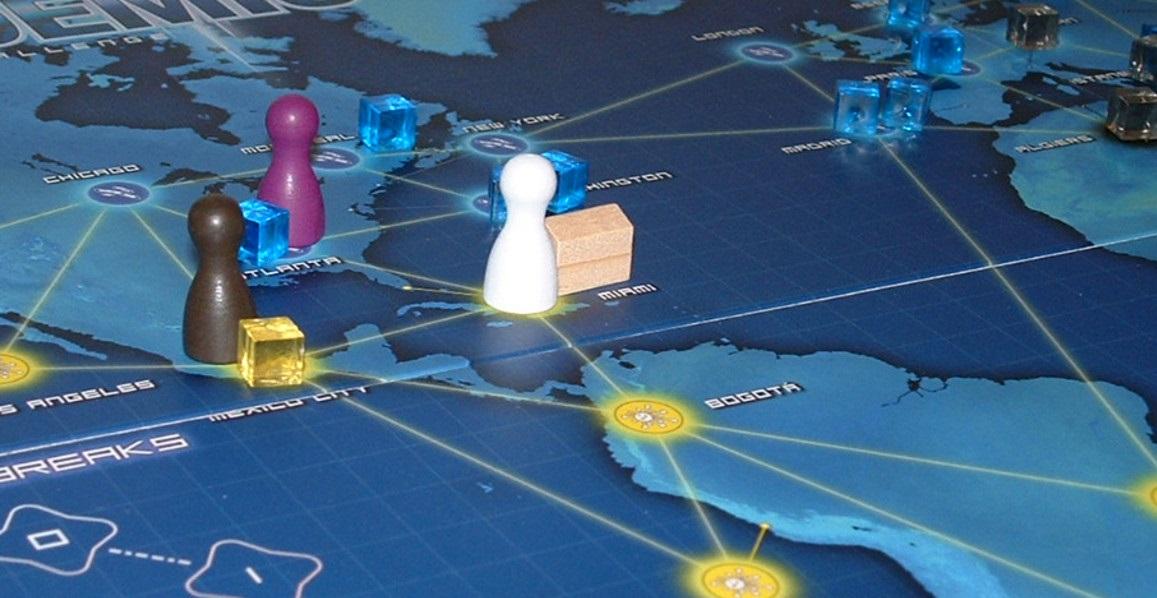Board Game Mechanics – Action Retrieval
The action retrieval mechanic is a game mechanic commonly used in board games where players have a set of actions available to them, but once an action is taken, it becomes unavailable until a specific condition is met, allowing the player to retrieve it and use it again.
One common way to use the action retrieval mechanic is through the use of a “cooldown” period, where a player must wait for a certain number of turns or rounds before they can use the action again. Another way is through the use of a resource cost, where a player must spend a specific resource in order to retrieve the action.
Here are ten polpular games that feature the action retrieval mechanic.
- Pandemic: In this cooperative game, players take on the roles of scientists, researchers, and other specialists working together to stop the spread of deadly diseases. Players use action points to move around the board, treat infected populations, and research cures. The action retrieval mechanic allows players to pick up used action cards, which can be used again in future turns.
- Scythe: Set in an alternate history version of 1920s Europe, Scythe is a game of strategy and resource management. Players represent different factions vying for control of a war-torn land. The game features an action queue mechanic, where players place their actions on a board and retrieve them in a specific order on subsequent turns.
- Eclipse: In Eclipse, players represent different alien civilizations exploring and conquering a vast galaxy. The game uses an action retrieval mechanic, where players place their used action discs on a board and retrieve them on future turns. The game also features a technology tree that allows players to unlock new abilities and upgrade their ships.
- Lords of Waterdeep: Set in the Dungeons & Dragons universe, Lords of Waterdeep is a game of resource management and strategy. Players represent powerful lords of the city vying for control and influence. The game features an action retrieval mechanic, where players use their agents to carry out various tasks and retrieve them on future turns.
- Tzolk’in: The Mayan Calendar: In this game, players represent different Mayan tribes competing for resources and power. The game features a unique action retrieval mechanic using a rotating gear system, where players place their action pawns on the board and retrieve them as the gears turn.
- Stone Age: Set in prehistoric times, Stone Age is a game of resource management and strategy. Players represent different tribes competing for food, resources, and prestige. The game features an action retrieval mechanic, where players place their workers on various spaces to gather resources, build structures, and increase their tribe’s standing.
- Anachrony: In this post-apocalyptic game, players represent different factions struggling to survive in a harsh new world. The game features an action retrieval mechanic using a unique “exosuit” system, where players send their workers into the future to gather resources and bring them back to the present.
- Concordia: Set in ancient Rome, Concordia is a game of strategy and resource management. Players represent powerful merchants competing for wealth and influence. The game features an action retrieval mechanic, where players use their cards to carry out various actions and retrieve them on future turns.
- Trajan: In Trajan, players represent powerful Roman politicians competing for power and influence. The game features a unique action retrieval mechanic using a “Mancala” style board, where players place their action markers and retrieve them in a specific order on future turns.
- Istanbul: In Istanbul, players represent merchants navigating the bustling markets of an exotic city. The game features an action retrieval mechanic, where players move their merchant and assistants around the board, gather resources, and retrieve them on future turns. The game also features a unique “wheelbarrow” mechanic, where players can transport their resources more efficiently.
An example of the action retrieval mechanic can be found in the board game Gloomhaven. In this game, players control a group of adventurers who explore dungeons and battle monsters. Each adventurer has a set of action cards they can play each round, but once a card is played, it becomes “spent” and cannot be used again until the player takes a rest. During a rest, the player must choose which spent cards they want to retrieve and add back to their hand, but they must also choose whether to lose hit points or lose a card from their permanent deck, adding a strategic element to the decision.
The action retrieval mechanic can also be found in the game Scythe. In this game, players have a set of four action tokens that can be used to perform various actions on the board. Once a player has used all four action tokens, they can either retrieve all of them or just one of them as their turn action. Retrieving an action token allows the player to take an additional turn later in the game.
Another example of the action retrieval mechanic can be found in the game Caverna. In this game, players have a set of action tiles that can be used to take various actions, such as mining resources or farming. Once a player has used all of their action tiles, they can either retrieve all of them or just one of them as their turn action. Retrieving an action tile allows the player to take an additional turn later in the game.

